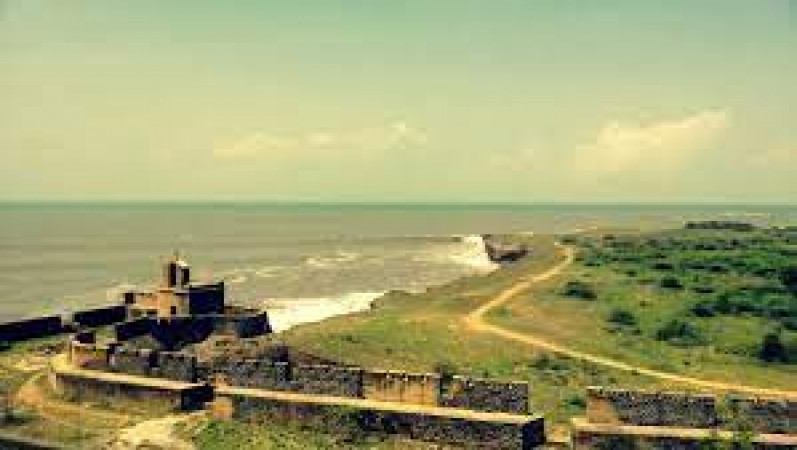
Diu Fort Travel Guide
Diu Fort, located in the union territory of Diu in India, holds immense historical significance. Built during the Portuguese colonial rule in the 16th century, the fort stands as a testimony to the region's rich past. Situated along the coastline, the fort offers breathtaking views of the Arabian Sea, making it a popular destination for history buffs and nature lovers alike.Top Attractions in Diu Fort
- St. Paul's Church
- Gangeshwar Temple
- Naida Caves
- Nagoa Beach
- Shell Museum
Diu Fort is Famous for
Its picturesque location and well-preserved architecture make Diu Fort famous among tourists.Top Attractions in Diu Fort
- Exploring the historic Diu Fort
- Relaxing on the pristine Nagoa Beach
- Visiting the unique Naida Caves
- Witnessing the beauty of Gangeshwar Temple
- Discovering the marine life at Shell Museum
What's Great about Travelling to Diu Fort?
- Perfect blend of history and natural beauty
- Ideal for a peaceful getaway
- Great for photography enthusiasts
What's Not So Great about Travelling to Diu Fort?
- Limited nightlife options
- May not be suitable for thrill-seekers
- Hot and humid weather during summers
Travel Tips for Diu Fort
- Carry sunscreen and hats for sun protection
- Respect the local customs and traditions
- Book accommodation in advance during peak tourist seasons
Important Diu Fort trip information
- Ideal Duration: 2-3 days
- Best Time to Visit: October to March
- Nearby Airports and Railway Stations: Diu Airport and Delvada Railway Station
Per Person
31,599
*EXCLUDING APPLICABLE TAXES 4.1 Ratings
( 56 Reviews )
( 56 Reviews )
Total
68,000
*EXCLUDING APPLICABLE TAXES 4.1 Ratings
( 56 Reviews )
( 56 Reviews )
Per Person
38,990
*EXCLUDING APPLICABLE TAXES 4.1 Ratings
( 56 Reviews )
( 56 Reviews )
Total
68,000
*EXCLUDING APPLICABLE TAXES 4.1 Ratings
( 56 Reviews )
( 56 Reviews )
Per Person
13,529
*EXCLUDING APPLICABLE TAXES 4.9 Ratings
( 200 Reviews )
( 200 Reviews )
Per Person
22,745
*EXCLUDING APPLICABLE TAXES 4.9 Ratings
( 200 Reviews )
( 200 Reviews )
FAQ's on Diu Fort
Q1: What is the best time to visit Diu Fort?
The best time to visit Diu Fort is during the winter months from November to February when the weather is pleasant and ideal for exploring the fort and its surroundings. This period also coincides with various cultural events and festivals in the region, making it a vibrant time to visit.
Q2: Do I need a visa to travel to Diu Fort?
Foreign tourists visiting Diu Fort typically require a valid Indian visa. However, travelers from certain countries may be eligible for e-Visa facilities or visa-on-arrival options. It is advisable to check with the local embassy or consulate for the most up-to-date visa requirements before planning your trip.
Q3: What are the must-visit attractions in Diu Fort?
Diu Fort is a historical gem with attractions like the Diu Museum, Panikotha, and the magnificent sea views from the fort walls. Visitors should also explore the nearby Naida Caves, Church of St. Paul, and the stunning beaches of Diu like Nagoa Beach and Ghoghla Beach.
Q4: Is Diu Fort a safe place to travel?
Diu Fort is generally a safe destination for travelers. However, it is recommended to take standard precautions like safeguarding your belongings, avoiding isolated areas at night, and being cautious of touts. The local authorities and tourism police ensure the safety of visitors, but it's always wise to stay vigilant.
Q5: What is the local currency in Diu Fort and can I use credit cards?
The local currency in Diu Fort is the Indian Rupee (INR). While credit cards are accepted at some hotels, restaurants, and larger establishments, it is advisable to carry cash for smaller transactions. ATMs are also available in the main town area for convenient access to money.
Q6: What is the local cuisine like in Diu Fort?
The local cuisine in Diu Fort is a blend of Gujarati, Portuguese, and seafood influences. Must-try dishes include seafood thali, fish curry, and coconut-based delicacies. Vegetarians can savor dishes like dhokla and fafda. Don't miss out on trying the local specialty - Feni, a traditional liquor made from cashew or coconut.
Q7: What transportation options are available in Diu Fort?
In Diu Fort, visitors can explore the area on foot due to its compact size. Additionally, there are options for renting bicycles or scooters to travel around the island. Taxis and auto-rickshaws are also available for longer journeys or for reaching specific attractions. Public buses connect Diu Fort to other parts of the island.
Q8: Are there any cultural norms or etiquette I should be aware of when visiting Diu Fort?
When visiting Diu Fort, it is important to respect local customs and traditions. Dress modestly, especially when visiting religious sites. It is customary to remove your shoes before entering temples or homes. While interacting with locals, greet them with a smile and show courtesy. Avoid public displays of affection, and ask for permission before taking photographs, especially of people. Embracing the local culture will enhance your experience in Diu Fort.
Q9: I am a travel agent. How can I buy travel leads of Diu Fort?
Register yourself as a travel agent at agents.tripclap.com and then you can buy travel leads to Diu Fort once your account is approved. For more details contact our support team at +91-8069186564 or support@tripclap.com




